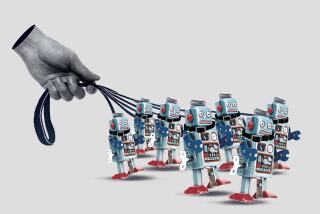Beyond 2000 : The Jobs of the Past, the Jobs of the Future : A Short Time Trip Into the Next Millennium.
- Share via
In the 1960s, it was key punch operators who were supposed to have the inside track for job longevity. Who knew? Today we think software programmers have the E-ticket, but even their skills may become as obsolete as that Disney tradition. One thing’s for sure: As the global economy is increasingly influenced by the Internet, cyberspace will have a major role in shaping the future of business.
Take, for example, the “e-cash” economy envisioned by futurists, in which money exchanges will be made electronically. From that a host of global cottage industries will develop to take advantage of the expanded electronic marketplace.
In fact, top analysts say, thanks to a rapidly evolving computer technology, there’s not a single job description that won’t be radically different in 10 years. Sure, traditional job categories--real estate, law enforcement, firefighting--will stay around, but some very familiar figures will go the way of the uniformed gas station attendant.
“It’s a volatile environment,” says Paul Saffo, a director at the Institute for the Future, a Menlo Park-based think tank. “It’s best to keep your bets hedged and to be educated. I’d make damn sure to develop skills in the digital arena.”
Fortunately as some jobs are phased out, others will emerge. To help you hedge your bets, here’s a list of jobs that will most likely be obsolete in 10 years and jobs that will most likely emerge in the next decade.
On the Way Out
1. Secretary. Despite the advent of personal computers, electronic mail and fax machines secretaries still spend more than 45% of their time filing papers, delivering messages, posting letters and making photocopies. But more sophisticated electronic office systems will make it possible for executives and managers to turn even scribbled notes into memos and have them distributed with the flick of a command key. As we move closer to becoming a paperless society, says Jeremy Rifkin, author of the “End of Work,” which predicts how machines will eliminate jobs, typist secretaries will virtually disappear. Rifkin, who is president of the Foundation on Economic Trends in Washington, also projects that executive assistants will probably survive, managing the time and responsibilities of a group of people through information tools.
2. Bank Teller. By the year 2000, nearly all banking customers will use automated teller machines. The few tellers who do remain will be the “front line of sales [of bank services],” says Saffo. Even if tellers don’t discuss actual investment opportunities with business customers, bank tellers will be “expected to deal with a much wider range of problems.”
3. Telephone Operator. AT&T; expects to replace more than half of its long-distance operators with robotized voice-recognition technology within the next several years. That technology, along with automatic call-switching networks and voice-message systems, will eliminate more jobs. Companies such as AT&T;, GTE Corp., Nynex and Pacific Telesis have slashedtheir employment 20% to 40% from their peaks of a few years ago.
4. Receptionist. Wildfire Communications Inc. of Lexington Mass. now offers a highly sophisticated voice-recognition system that manages both incoming and outgoing calls. Other companies have similar systems in development. “ ‘We’ll call you’ takes on a whole new meaning,” says Rifkin.
5. Middle Manager. In the 1980s alone, more than 1.5 million mid-level-management jobs were eliminated at U.S. companies, including IBM, General Motors and Chevron. Just how tenuous is the middle manager’s hold on his or her job? Ask someone from Eastman Kodak Co., which went from 13 to three levels of management in one year. “It’ll be the end of people managing or implementing strategy,” says Rifkin. Top levels of management, he says, instead create policies that will be carried out by worker-managers.
6. Public Librarian. Computers have already replaced their beloved card catalogues and soon may replace libraries as we know them. Despite the thrill of physically browsing through books, ultimately we’ll forget about the traditional library, says Lawrence Wilkinson, co-founder and managing director of Global Business Network in Emeryville, Calif. Instead, we’ll simply message a librarian to send the book over the Internet.
7. Wholesale Merchant. The new information technologies allow retailers and manufacturers to work directly with each other, virtually eliminating wholesalers. In 1992, the wholesale trade industry lost 60,000 jobs. Since 1989, the wholesale sector has dropped more than a quarter of a million jobs.
8. Medical Specialist. Specialists currently outnumber primary-care physicians 2 to 1, but with managed care regulating visits to specialists, many doctors are moving away from their specialty practices. According to Edward Sekscenski, an economist at the Bureau of Health Professions in the U.S. Public Health Service, anesthesiologists, ophthalmologists, plastic surgeons and some specialized radiologists will be the hardest hit.
9. Farm Operators, Managers and Workers. The U.S. Bureau of Labor Statistics foresees that 234,000 farm operators and managers along with 153,000 farm workers will be out of work by 2005. The reasons for the decline are fairly obvious: advances in technology that make farms more productive while less labor-intensive, the continued growth of corporate farms and the natural elimination of family farms. In 1982, there were 2.2 million family farms. Ten years later, there were 1.8 million.
10. Newspaper Delivery. The development of online versions of daily newspapers makes it obvious that the industry is moving toward multimedia. The total number of daily newspapers is at an all-time low--1,556 in 1993, according to the Newspaper Association of America. It probably won’t rise again.
On the Way In
1. Interactive Advertising Executive. We probably won’t know how online advertising will work until we have figured out how to exchange money over the Internet, but cyberspace will offer substantial numbers of new jobs to the advertising business. The Bureau of Labor Statistics foresees job growth for writers, artists, designers, actors and public relations specialists in the field. While traditional advertising pushed ad campaigns onto the public, cyber-advertisements will entice the public to be a part of the campaign. One ad firm has already designed for the Internet a serial campaign for the alcoholic beverage Zima.
2. Information Agent. With enhanced computer networking, this individual will act like a purchasing agent with a curatorial role--serving as a travel agent, insurance agent and financial adviser in one. Wilkinson of the Global Business Network likens it to the newspaper editor, who selects and presents stories in order of importance. The information agent will prioritize personal information in a similar fashion.
3. Cyber Librarian. The librarians of the future will no longer work in service centers hoarding scarce reference information, Saffo says. Instead, once the contents of the Library of Congress are catalogued online, librarians will act as filters, distilling the flood of available information to a trickle people can cope with. An Internet Public Library is currently being run as a class project at the University of Michigan School of Information and Library Studies.
4. Answer Network Technician. With the commercial development of the Internet, the answer network technician will make a living accessing databases and a host of experts to respond to questions in different areas, most likely in scientific and engineering fields, says Robert Russman Haleprin, executive director of the MIT Center for Coordinated Studies.
5. Community Concierge. According to GBN’s Wilkinson, businesses will soon be in place in which a bonded employee will perform a number of services, such as delivering groceries and dry cleaning to your home. As the Internet makes it easier to purchase products and services, these businesses will respond to consolidate their delivery.
6. Net Technologist. They’ll behave like cyber “phone linesmen,” fixing problems within a network and maintaining the company’s access to the Internet. There will be an explosion of these types of jobs within companies, predicts Wilkinson.
7. Electronic Security Guard. There have already been some well-publicized cases involving the new demands of cyber security, such as that of computer security expert Tstutomo Shimomura, who helped nail hacker Kevin Mitnick. Wilkinson projects that the presence of electronic security guards will grow, mostly within corporations. And as the Internet is increasingly commercialized, there will be an increase in the number of police officers who work on fraud cases.
8. Para-Professional. According to Saffo, more people will “hedge” their careers. For example, pre-law students who don’t get into the top law schools may opt to become paralegals instead, a position better paid and more valued than that of a junior attorney. “It won’t be like you sunk your whole life into a career,” he notes.
9. Intellectual Mercenary. The cleanup after the World Trade Center bombing was organized by a consultant who hired janitors on contract. The Internet will make it even easier for consultants to take on short-term projects, according to MIT’s Haleprin. Whether it’s evaluating a loan or designing a lawn mower, the mercenary will be able to quickly assemble a team from several different organizations by advertising electronically or by connecting to a database of available people.
10. Volunteer in the Nonprofit Sector. “Automation may be taking over a lot, but the work that remains to be done will grow, whether it’s fixing potholes, stamping out child abuse or working in international trade,” says William Bridges, author of “Jobshift.” “There may not be many recycling jobs, but there’ll be a lot of recycling to be done.” A solution? Led by Rifkin, experts suggest federally funded income vouchers or tax credits for the jobless who volunteer their time doing meaningful work.
*
The following individuals were helpful in compiling these lists: William DiFazio, co-author of “The Jobless Future,” William Bridges, author of “Jobshift,” and Greg Riker, director of advanced consumer technology at Microsoft.
More to Read
Inside the business of entertainment
The Wide Shot brings you news, analysis and insights on everything from streaming wars to production — and what it all means for the future.
You may occasionally receive promotional content from the Los Angeles Times.










